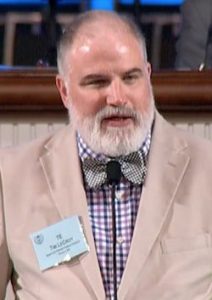Southern Baptists aren’t the only U.S. denomination struggling with how to prevent and respond to clergy sexual abuse. The Presbyterian Church in America — the more conservative wing of U.S. Presbyterianism — finds itself in a knot as well.
An all-male group of PCA commissioners recently voted down four proposals related to preventing sexual abuse while affirming a proposal to ensure women cannot be given the title “pastor,” “deacon” or “elder” in any PCA church.
During debate on the proposed restriction on church job titles, Missouri Pastor Charles Stover said, “The peace and the purity of the church has been disturbed by churches attributing offices to candidates not qualified for said office.”
Much like the restrictions enacted by the Southern Baptist Convention the same week in June, the PCA affirmed its theological position that Scripture prevents women from holding certain offices of church leadership named in the New Testament.
Only ordained people may hold those titles, and only heterosexual males may be ordained.
The 50-year-old conservative Presbyterian body has been rocked by salacious tales of abuse that were ignored, covered up and downplayed.
Although the PCA has not conducted a massive investigation of mishandled sexual abuse cases as the SBC Executive Committee did, the 50-year-old conservative Presbyterian body has been rocked by salacious tales of abuse that were ignored, covered up and downplayed by churches and pastors in authority.
A recent news report in Christianity Today explained: “Many presbyteries have put survivors through a procedural grinder that survivors say was worse than the abuse itself. Multiple cases CT reviewed that went through the church court process had thousands of pages of documentation, and sometimes stretched out for years. Laypeople were bewildered trying to file formal charges.”
Further, with its all-male leadership structure, female victims and victims’ advocates have accused church leadership of an “old boys’ network” that protects other men at all costs.
Amid this backdrop, PCA commissioners were presented last week with four “overtures,” as the denomination calls proposals, related to preventing sexual abuse. All four were rejected by the male leadership, with some saying such changes are simply not necessary.
Among the four rejected overtures, one would have required mandatory background checks for clergy as they are ordained or transferred to new posts, one would have improved communication between PCA leadership on abuse reports, and two would have expanded eligibility of witnesses in church court cases.
Currently, witnesses must “believe in God, heaven and hell.”
High-profile sex abuse prosecutor Boz Tchividjian tweeted his disgust at the rejections.
“The PCA recently REJECTED four overtures that focused on protecting sexual abuse victims. … Yet more reasons why I am no longer part of the PCA.”
The Nashville Tennessean reported: “Advocates for reform described this year’s overtures as low-hanging fruit. Not only did the General Assembly vote against all four overtures, but a debate on the floor highlighted the depth of disagreement over the seriousness of the issue and the necessary lengths to address it.”

Tim LeCroy speaks to the PCA’s General Assembly June 15 (.Screenshot from Vimeo)
The Tennessean quoted New York pastor Tim LeCroy, part of a committee studying domestic abuse and sexual assault in the church, as saying: “The world is watching and they’re waiting to see how we’ll respond to the issue of abuse. Our church members are waiting to see how we will respond on the issue of abuse. And you have a choice.”
The choice made was to send all four proposals back for further work.
Again from the Tennessean: “Alabama pastor Steve Dowling, who chaired this year’s overtures committee, said his committee recommended voting down the overtures because it wasn’t necessary. ‘The current system has worked and is working and that it shouldn’t be changed to accommodate remote possibilities,’ Dowling said at the PCA General Assembly.”
Yet according to Christianity Today’s reporting, that system isn’t working so well: “The PCA, with its ostensible system of leadership accountability, may demonstrate how every denomination needs to have a reckoning with abuse from the outside. The denomination has the structure for abuse accountability in theory, PCA elders say, but not in practice.”
The PCA shares much in common with the modern-day SBC, which has a strong Calvinist faction and also is driven by complementarian theology that sees a “created order” or hierarchy with men at the top.
The PCA is the second-largest Presbyterian body in America, behind the Presbyterian Church (USA), and is the largest conservative Calvinist denomination in the nation.
The denomination was formed in December 1973 in a split with the PCUSA, partly over the ordination of women. Today, the group counts about 1,900 churches with 380,000 people in its membership. More than 5,000 ordained ministers are recognized by the PCA.


